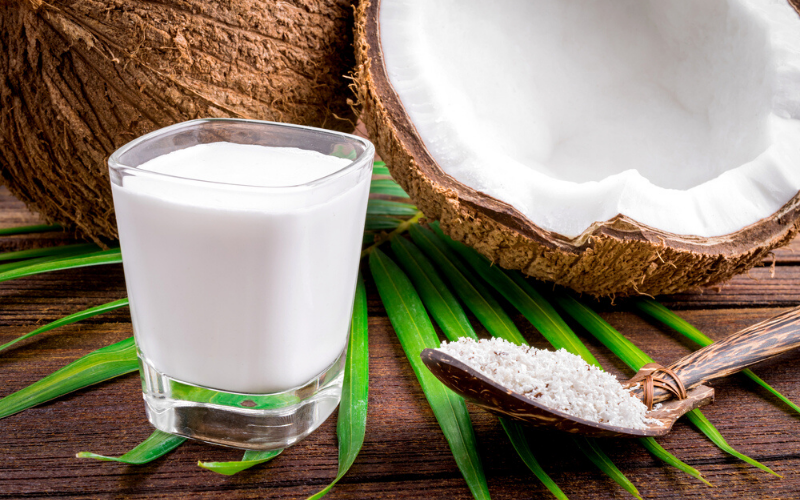Finding the best substitutes for coconut milk can seem like a daunting task, especially when recipes specifically call for its unique flavor and texture. But, fear not, we have got you covered!
In this guide, we will delve deeper into the nutritious content for each substitute, share our personal experiences with these alternatives, and tell you specifically what dishes they are best for. By the end, you’ll know exactly how to experiment and bring variety to your cooking with these coconut milk alternatives.
The Best Substitute for Coconut Milk in Cooking: Top 10
| Substitute | Calories & Fat Content | Best Used In | Highlights |
|---|---|---|---|
| Yogurt | 100-150 calories, 3g fat | Asian dishes, stews, smoothies | Lower in calories and saturated fat than coconut milk. |
| Soy Milk | 80 calories, 4g fat | Curries, sauces, coffee | Rich source of vitamin D, calcium, and protein |
| Evaporated Milk | 20 calories, 1g fat (per tablespoon) | Creamy dishes | Caramelized flavor can mimic coconut milk |
| Silken Tofu | 55 calories, 2g fat (per 100g) | Desserts | High in protein and 100% vegan |
| Almond Milk | 30-35 calories per cup | Baking, hot beverages | Lower fat content with a nutty flavor |
| Cashew Milk | 25-50 calories per cup | Sauces, soups, desserts | Provides sweet, creamy consistency |
| Oat Milk | 120 calories per cup | Coffee beverages, stews, curries | Natural sweet flavor and ability to withstand high heat |
| Heavy Cream | 51 calories, 5.5g fat (per tablespoon) | Creamy soups, curries, sauces | Adds richness and thickness to a dish |
| Fresh Milk | Varies (lower fat content) | Dishes that don’t rely on a thick consistency | Simpler and straightforward substitute |
| Spiced Milk | Varies | Flavored dishes | Rich in calcium and offers a different taste experience |
01. Yogurt: A Nutritious and Creamy Substitute
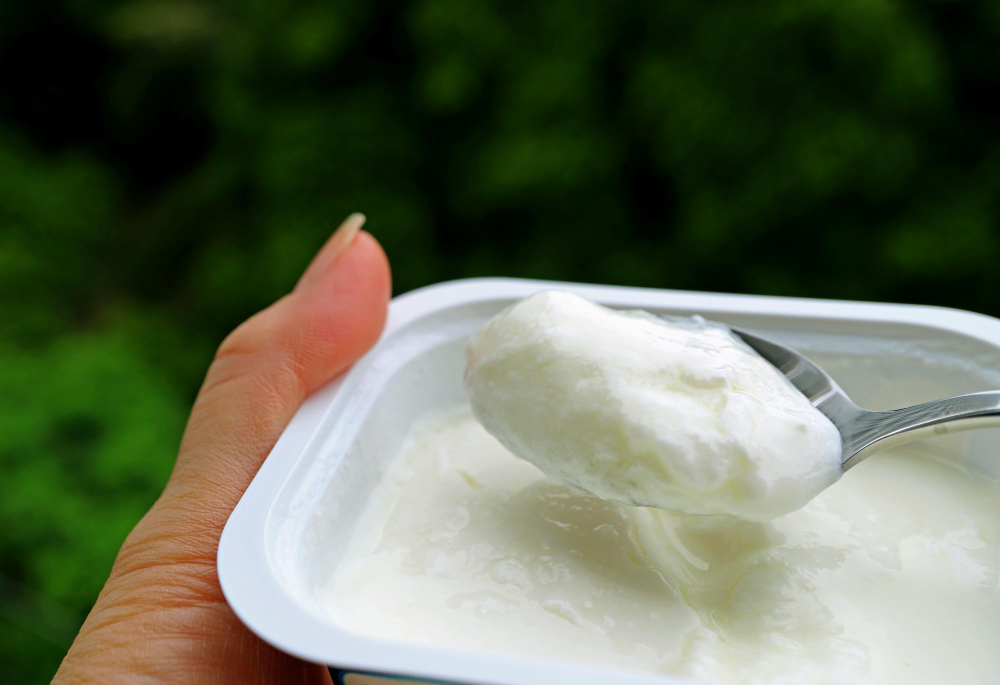
A common coconut milk substitute that comes to mind is yogurt. Yogurt is a healthy and delicious option which provides an abundance of probiotics, proteins, and vitamins. It contains fewer calories and less saturated fats than coconut milk, and has less lactose compared to other dairy substitutes. Regular yogurt contains about 100-150 calories and 3g of saturated fat per serving.
Using Yogurt in Your Dishes
Greek yogurt can work wonders in Asian dishes and stews because it maintains a similar consistency to coconut milk. If you’re making a smoothie and want it to be a bit thicker, Greek yogurt is the way to go! Be aware of its sharper taste – adjust quantity accordingly.
Best for:
- Asian dishes, stews, and smoothies.
Not Recommended for:
- Coffees.
Amazon Product Recommendation:
A good Non-Fat, Non-GMO Project Verified, Protein-Rich, and gluten-free with No Added Sugar Greek yogurt is FAGE TOTAL, 0% Plain Greek Yogurt.
02. Soy Milk: Best for Curries and Sauces
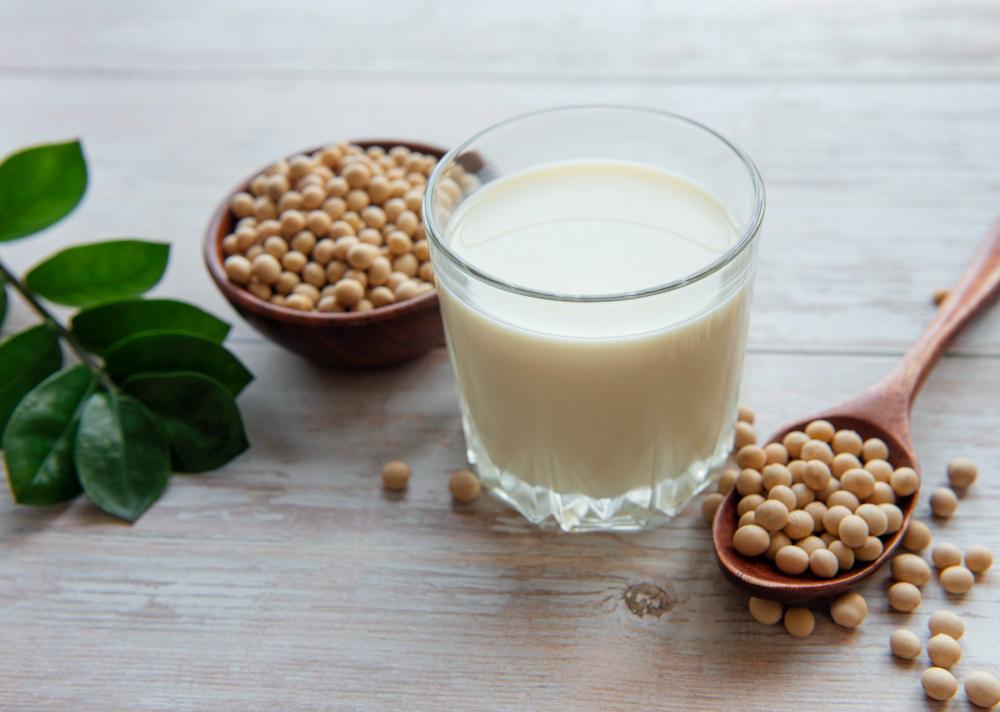
Another great coconut milk substitute is soy milk. Made from soybeans, this non-dairy substitute contains very little saturated fat and many healthy nutrients (vitamin D, calcium, protein, etc.).
Working the morning shift at the café, serving coffee was routine. Substituting coconut milk with soy milk for lattes was a personal favorite experiment of mine. With its creamy consistency and about 7 grams of protein per cup, soy milk is a nutritional powerhouse. It also provides approximately 4 grams of fats, which is lower than coconut milk, and supplies about 300-400 milligrams of potassium.
One drawback is that soy milk is slightly thinner in consistency than the milk from the coconut. This can be fixed by mixing one teaspoon (1 tsp) of cornflour (cornstarch) into the soy milk before using it. Or you can simply opt for soy milk powder where you can easily alter the thickness.
Soy milk is preferable in curries and sauces because its flavor won’t overwhelm the other ingredients. Just remember not to use it in high heat dishes, as soy milk tends to curdle.
Some recipes are not affected by the consistency of the milk (the sauces can be fairly thin sometimes) which makes soy milk a safe alternative. However, make sure to use an unsweetened, unflavored version of soy milk as the sweetened ones can change the flavor of the dish. Additionally, you can add coconut oil or coconut flavoring to enhance the richness of the dish.
Best for:
- Curries, sauces.
Not Recommended for:
- Coffees or high heat dishes. Soy milk curdles in high heat so avoid using in dishes that require high heat.
Amazon Product Recommendation:
USDA Organic Certified, Non-GMO Project Verified is Westsoy Organic Unsweetened Soymilk.
Other USDA-certified calcium and vitamin-enriched options are Pearl Organic Soymilk or organic and gluten-free Eden Soymilk.
Additionally, another option is 100% Organic soybeans, Non-GMO, Gluten-Free, Cholesterol Free, Trans Fat-Free, Lactose-Free Super NutreMill Instant Soymilk Powder.
03. Evaporated Milk: Creamy and Flavorful
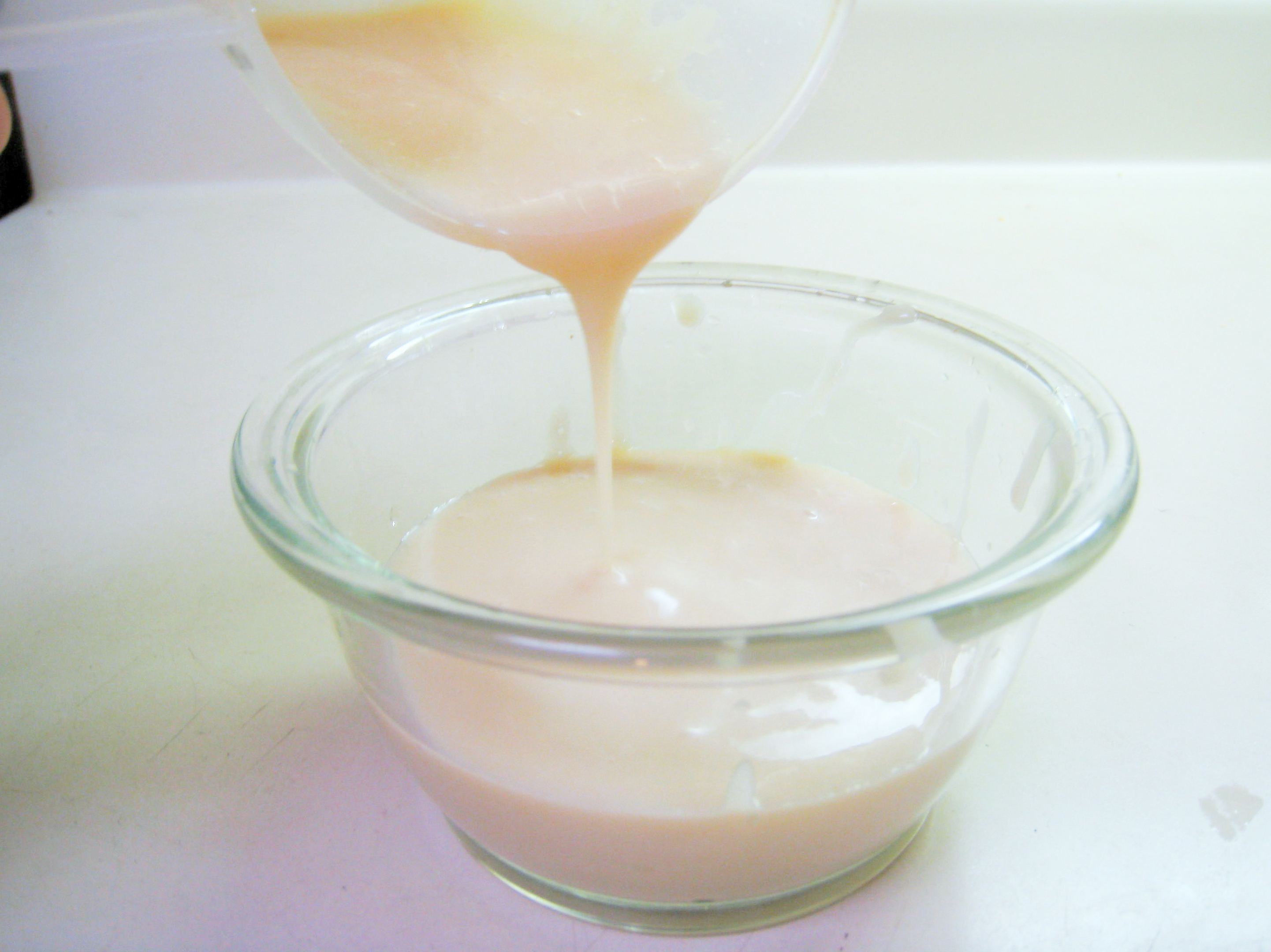
For those who can’t resist the creamy texture of coconut milk, evaporated milk is the way to go. Its creamy and caramelized flavor profiles are perfect for several dishes. A single tablespoon of evaporated milk provides around 20 calories and about 1g of fat.
With a slightly thicker consistency than regular milk, evaporated milk is made by heating cow milk until about three-fifth (60%) of its water content has evaporated. You can fill the void of the coconut flavor by adding a few drops of coconut essence.
The caramelized undertones of evaporated milk make it an incredible substitute for coconut milk. Nutrition-wise, evaporated milk provides about 338 calories per cup. However, use it sparingly if you’re monitoring your saturated fat intake as it contains about 5 grams per 100 grams. One afternoon, we ran out of coconut milk for a tropical dessert, and using evaporated milk worked perfectly!
Moreover, the creaminess and caramelized flavor of evaporated milk serve as a perfect base for several dishes. All you need to do is replace coconut milk with an equal quantity of evaporated milk.
Best for:
- Coffee
- Curries
- Smoothies
- Soups
- Creamy dishes
- Baking
- Slow cooking
Not Recommended for:
- Dairy intolerant people.
Amazon Product Recommendations:
Highly concentrated and unsweetened CARNATION Evaporated Milk can be used to flavor beverages, in baking, candy flavoring, and much more! A good evaporated milk made from coconut would be dairy-free, soy-free and vegan Nature’s Charm Evaporated Coconut Milk.
04. SILKEN TOFU
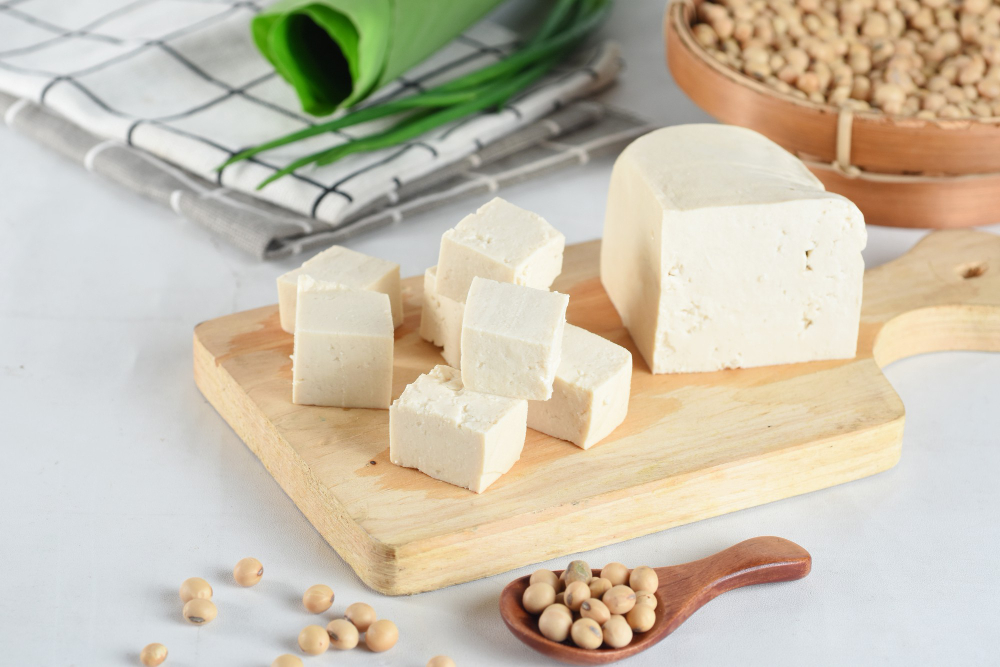
Silken tofu, made by pressing condensed soy milk, is our next best go-to! Its 100% vegan composition, protein content, low-fat and calorie proportion make silken tofu heavily popular among health geeks.
Due to its high water content, puréed silken tofu mixed with equal parts of soy milk concocts a smooth and creamy liquid that can replace coconut milk in similar quantities. As silken tofu has a very mild flavor, it can easily be substituted with strong-flavored dishes.
When you are looking for a vegan-friendly substitute for coconut milk, look no further than silken tofu. Mixing this with soy milk in a 1:1 ratio will give you a creamy, high-protein substitute that’s perfect for your desserts. In terms of nutrition, a 100-gram serving provides around 55 calories, 2.2 grams of fat, and a whopping 5.5 grams of protein. We often used this trick to cater to our vegan customers at the café with a creamy pumpkin soup, and they could hardly tell the difference!
Best for:
- Pies
- Soups
- Smoothies
- Sauces
- Fruit or chocolate-based desserts
Not Recommended for:
- Dishes that require coconut flavor.
Amazon Product Recommendation:
USDA Organic Certified, Non-GMO Project Verified and Certified Gluten-Free is Mori-Nu Silken Organic Tofu.
05. ALMOND MILK
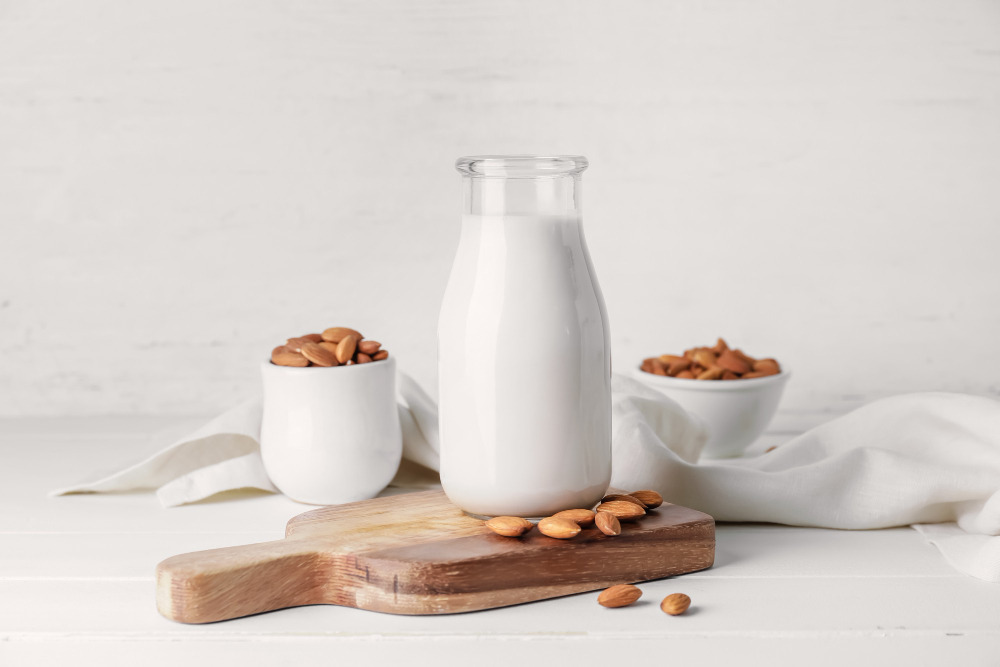
The availability, low-calorie content, and nutty flavor offered by almond milk is the reason why it’s one of our top choices! Unflavored and unsweetened almond milk can easily replace coconut milk in equal quantities.
However, the low-fat content and thin consistency of almond milk can’t provide the same creaminess as that of milk from coconut. If the base of your curry is fairly thin, or if you’re looking for a substitute for your daily coffee, then it won’t matter much if you use almond milk.
But, if you need a substitute to thicken up your gravy, adding in some cornstarch or gelatin or lemon juice will do the trick! If you want to keep the coconut flavor intact, dribble in some coconut oil or use coconut flour (keep in mind that you won’t need to add other thickening agents if you opt for coconut flour).
As a café server, I learned that almond milk is an excellent substitute for coconut milk, especially for lactose-intolerant individuals. Per cup, almond milk provides about 30-60 calories, making it significantly lower in calories than most milk alternatives. Additionally, it offers around 1-2 grams of protein and 2.5 grams of fat. It was the go-to choice for dairy-free lattes and worked wonderfully in baked goods.
You can also make your own almond milk. All you need to do is soak unsalted almonds overnight and blend them in warm water or milk. For thicker almond milk, use more almonds.
Best for:
- Hot beverages (coffees, lattes, etc.)
- Curries
- Smoothies
- Cereals
- Baking
Not Recommended for:
- Creamy dishes due to the low-fat content of almond milk
Amazon Product Recommendation:
Shelf Stable, Unsweetened, Unflavored, Organic, Silk Almond Milk is our go-to.
06. CASHEW MILK
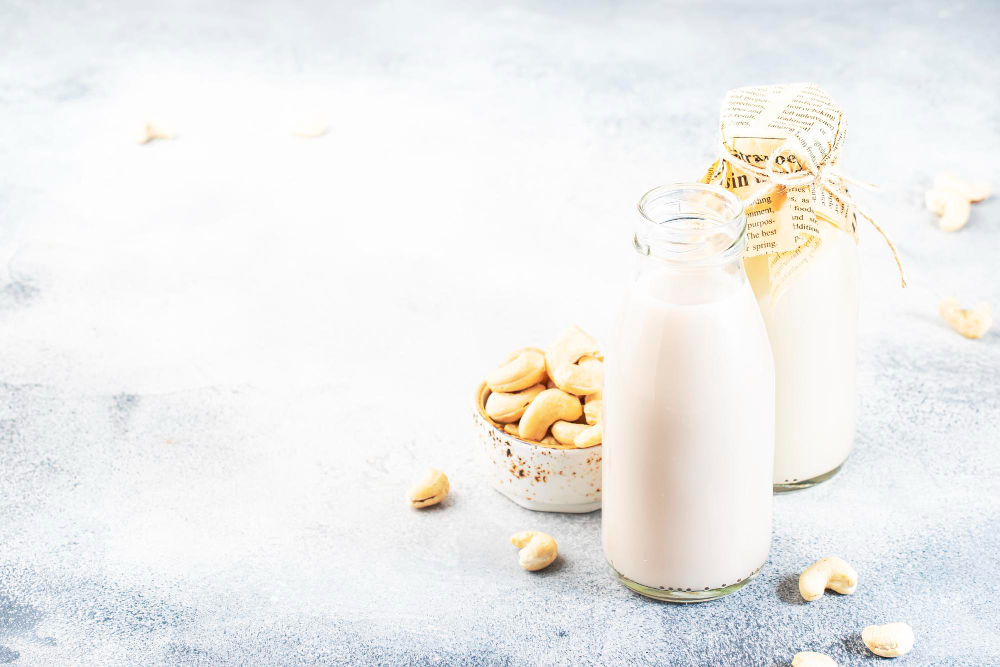
Another potential replacement is multi-purpose cashew milk. Having a consistency similar to that of cow’s milk, cashew milk is a perfect non-dairy substitute.
Cashew milk has a smoother and creamier texture than other nut milk and has a slightly sweet taste with a neutral undertone. It is low in calories and protein but has more fat than other plant-based milk.
Having a slightly sweet and creamy texture, cashew milk was another favorite of mine while working at the café. Nutrient-wise, it’s a fantastic option with only around 25-50 calories per cup and provides about 5 grams of carbs. It’s ideal for those on a low-calorie diet.
With a rich, creamy texture, high-fat content and a flavor that can fit in any sort of dish, cashew milk is perfect for making plant-based recipes, sauces, soups, and desserts have a velvety, creamy finish, much like coconut milk.
As another option, you can also opt for cashew cream which has an even higher fat content and is as creamy as coconut milk. Simply soak up some unsalted cashews (quantity depending on how thick you want your paste to be) with warm water overnight and blend them into a paste with some water or milk (of your choice).
Best for:
- Beverage recipes (coffees, lattes, smoothies, etc )
- Curries
- Soups
- Sauces
- Desserts
- Salad dressings
Not Recommended for:
- Thick curries.
However, to substitute it in thick curries, you can add thickening agents like cornstarch or gelatin to your milk and make the texture more concentrated,
Amazon Product Recommendation:
A dairy-free, non-GMO, vegan option is Pacific Foods Cashew Unsweetened Original Plant-Based Beverage. While one with no additives, preservatives or sweeteners is Plenish Organic 6% Cashew Milk.
07. OAT MILK
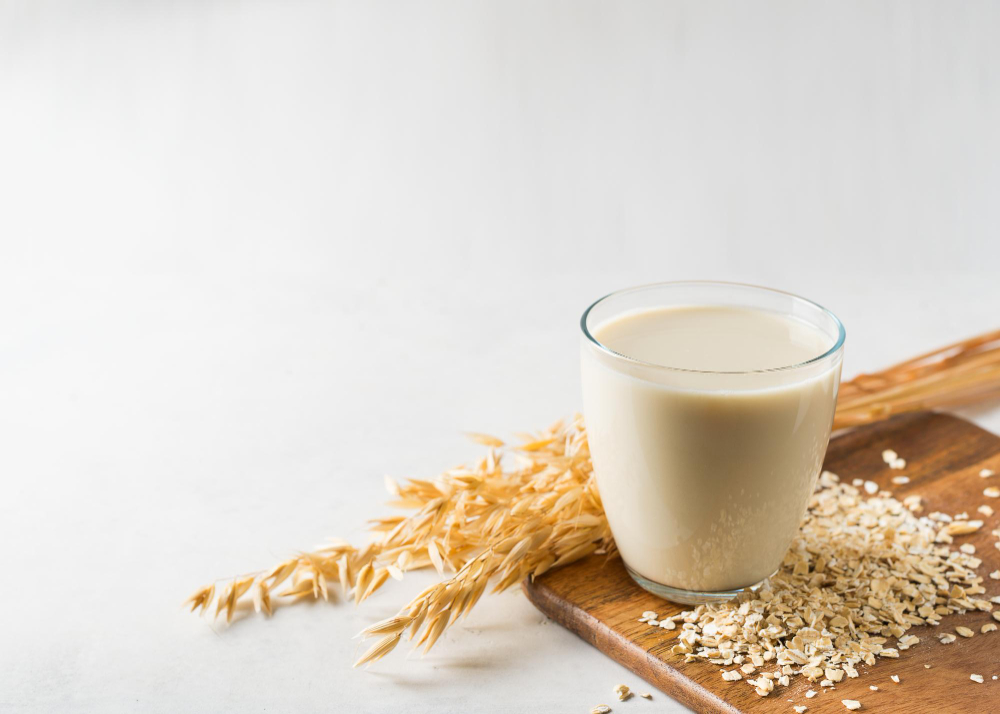
I was there when oat milk started gaining popularity in the Café due to its natural sweetness and creamy texture. It provides around 120-130 calories per cup, which is similar to cow’s milk and contains about 3 grams of protein. It quickly became a guest favorite for both coffee and baking.
The next top replacement is the one rising in popularity. Oat milk is naturally sweet, higher in calories and carbs yet lower in fat content than coconut milk.
With its mild creamy flavor, it is a perfect substitute for coconut milk in coffee foam. Since oat milk doesn’t curdle, it can be used in recipes that require high heat.
Oat milk has a slightly runny consistency. Adding cornstarch to thicken the milk and coconut oil to enhance richness is recommended by us.
It can be swapped with coconut milk in similar quantities. However, be sure to pick unsweetened, unflavoured oat milk.
Best for:
- Lattes
- Coffees
- Cereals
- Baking
- Stew or curry recipes that require high heat
Not Recommended for:
Some commercial oat milk is high in sugar and might not be gluten-free. Check the label and choose accordingly. Below are some of our recommendations.
Amazon Product Recommendation:
A cheaper alternative would be Oatsome. If you’re looking for a milk substitute to just lighten up your coffee or use in baking then you can opt for Oatly Oat Milk Barista Edition.
08. HEAVY CREAM
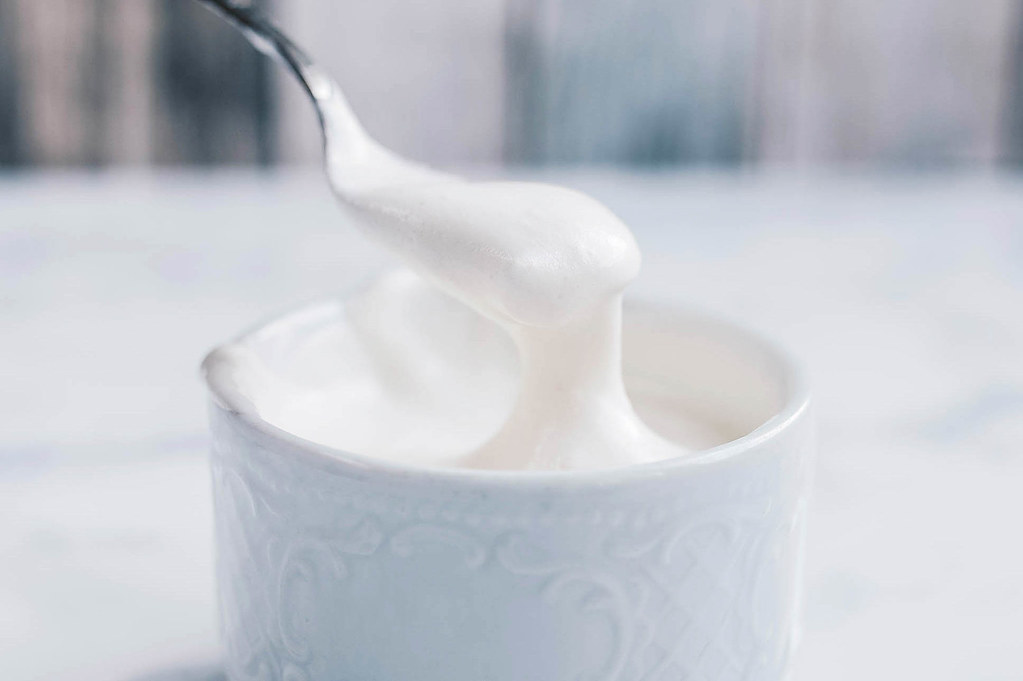
Our next coconut milk substitute is dairy-based heavy cream. Heavy cream has a thick, creamy texture, similar to the milk of coconut.
Yet, it is higher in fat and calories than coconut milk. The richness and thickness of heavy cream keep the texture of coconut milk intact and can be substituted in a similar ratio. As heavy cream is relatively flavorless, you can add some coconut water to keep the flavor of coconuts.
Though high in calories (about 821 calories per cup), heavy cream can provide the rich, creamy texture you’re after when substitifying coconut milk. While working an evening shift, heavy cream saved the day more than once when our coconut milk supply ran out for our creamy soups and sauces.
Best for:
- Creamy soups
- Curries
- Sauces
- Ice creams
- Smoothies
- Sorbet
- Baking
Not Recommended for:
- Heavy cream, as stated above, has a very high-fat content and is high in calories. So if you’re looking for a substitute to watch your weight, this might not be the one for you.
Amazon Product Recommendation:
With 50 calories per serving and 0% carbohydrate, we recommend using rich and creamy Land O’ Lakes’ Gourmet Heavy Whipping Cream. Vegan Whipped Cream Replacement, Dairy Free, Soy Free, Gluten Free, Coconut Free, and Shelf Stable Mix by Vivian’s Live Again is another recommended choice. Another dairy-free option is So Delicious Dairy Free Cocowhip Lite.
09. MILK

In terms of nutritional value, fresh milk is a strong contender, especially for those looking for a more straightforward alternative. Whole milk offers about 146 calories, 8 grams of fat, and 8 grams of protein per cup. Alternatively, skim milk has about 83 calories per cup and significantly less fat.
Fresh milk with high-fat content of any kind, dairy or non-dairy, will fill the void of coconut milk easily. We suggest using whole milk or 2% with some coconut oil for flavoring. The consistency of milk is rather runny so use it in less amounts, and mix it up with some nut milk or pastes for a heavier consistency.
Best for:
- Baking
- Curries
Not Recommended for:
- With its runny texture, regular fresh milk is not suited for thick sauce-based curries. However, you can add some cornflour to change the consistency.
10. SPICED MILK

I’ve learned that simple ingredients like spiced milk can take a dish from ordinary to extra special. By simmering milk with spices, we could create a flavorful base for our café’s signature chai latte. Remember, the nutritional content of spiced milk varies depending on the spices and milk used.
The creamy consistency and distinct flavor of spiced milk make it a very popular coconut milk substitute. Spiced milk can easily be made at home by heating milk (of any kind) with spices such as chili powder, curry powder, cinnamon, nutmeg, cardamom, saffron, or others of choice. The milk needs to be heated until it thickens and needs to be stirred periodically to prevent it from burning.
Best for:
- Soups
- Curries
- Other hot dishes.
Not Recommended for:
- Coffees
- Smoothies or other cold dishes.
Frequently Asked Questions (FAQ)
Below you’ll find answers to questions we get asked the most about coconut milk alternatives.
01. Can I Substitute Coconut Milk For Milk?
Coconut milk can be used in place of milk. However, you need to be aware that coconut milk tastes like coconut, which other kinds of milk don’t have. So, if you want a tasteless substitute, coconut milk is not recommended.
02. Can I Substitute Coconut Cream For Coconut Milk?
Coconut cream is essentially coconut milk, but with higher concentration. Coconut cream is thicker and has a richer flavor than coconut milk.
Subsequently, it is also high in fat and calories. So if you want a healthier substitute, this might not be an attractive option. Coconut cream also can’t bring out the flavors of spices.
Nevertheless, if you’re just looking for an instant alternative, coconut cream will deliver! Blend it with some water to dilute the cream and add it to your dish.
03. Can You Substitute Almond Milk For Coconut Milk?
Almond milk is non-dairy and widely available. It can be easily swapped with coconut milk in similar quantities. Just add in some thickening agents to reach the required consistency.
04. Can I Substitute Coconut Milk For Evaporated Milk?
Evaporated milk is basically regular milk heated until 60% of its water content evaporates off, which makes the milk creamy. While coconut milk will offer a similar texture, it will also have the flavor of coconut, so substitute wisely.
05. Can I Substitute Coconut Milk For Yogurt?
Having similar consistency, coconut milk can easily be used in place of yogurt. Especially in recipes that call for a coconut-y flavor.
A good choice would be Gluten-Free, Non-GMO Certified So Delicious Dairy Free Coconut Milk Yogurt Alternative, Plain.
06. Can I Substitute Carton Coconut Milk For Canned Coconut Milk?
Boxed coconut milk has more water content and less fat content than the canned coconut milk versions. While some recipes call for high-fat content, others just need the milky flavor so you can easily opt for the carton milk.
07. Can I Substitute Coconut Milk For Regular Milk?
Regular milk like cow’s milk or nut milk can be replaced by coconut milk. However, keep in mind that coconut milk will have the flavor of coconuts that regular milk doesn’t have.
08. Can I Substitute Coconut Milk For Condensed Milk?
Condensed milk is very sweet and thick so substituting it with coconut milk will require you to adjust the amount of milk to reach the desired consistency.
09. What Is A Good Substitute For Coconut Milk In Curry?
Any sort of milk with coconut oil, heavy cream with coconut water or spiced milk can replace coconut milk in curries.
10. What Can I Substitute Coconut Milk Powder With?
Regular milk powder can substitute coconut milk powder without the coconut flavor. Or you can simply use coconut milk instead of the powder. Coconut extract can also be used to provide the flavor of coconuts.
11. Can I Substitute Coconut Milk For Heavy Cream?
While both heavy cream and coconut milk have a creamy texture, heavy cream doesn’t have the flavor of coconut. If you’re okay with the coconut flavor, go ahead and use it as a substitute.
12. What Is A Good Substitute For Full-Fat Coconut Milk?
If you’re looking for low-fat substitutes, our top choices are soy milk, oat milk, almond milk, cashew milk, and silken tofu. If the fat content doesn’t bother you, then you can try heavy cream, half and half, evaporated milk, whole milk or spiced milk.
13. What Is A Good Substitute For Coconut Milk In Baking?
Good baking substitutes are fresh milk, oat milk, almond milk, evaporated milk, or heavy cream.
Final Thoughts
To sum it all up, if coconut milk isn’t your thing or if you’re allergic to it, you can choose from the several substitutes stated above. While some substitutes for coconut milk have more health benefits and others have more fat content, all of them work as an amazing alternative for coconut milk, given a few tweaks.
Additionally, if you can tolerate the fragrance and flavor of coconuts, you can add coconut flakes, coconut flour, coconut water, coconut essence or coconut extract to the substitutes mentioned above. Just pour them at a similar ratio of coconut milk in recipes. So, choose the one at your disposal and cook away!
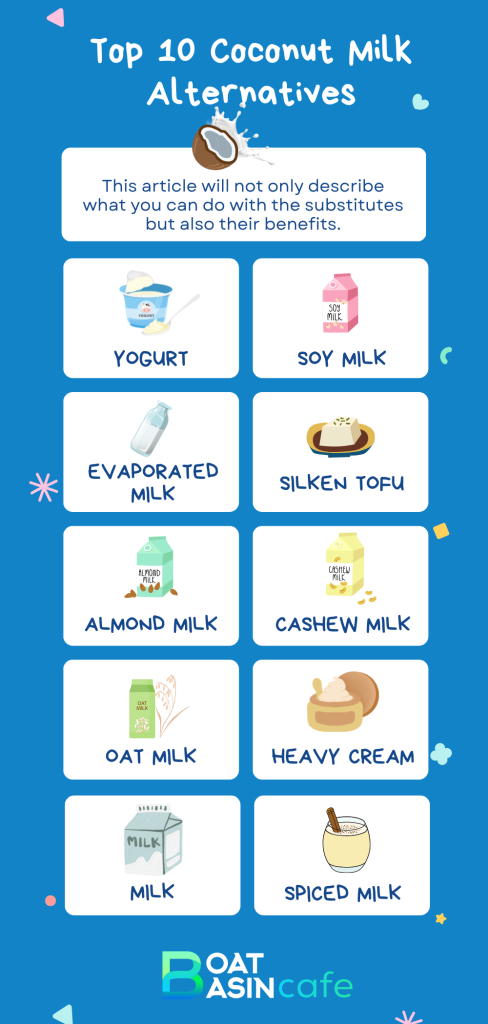
Related Topics:
